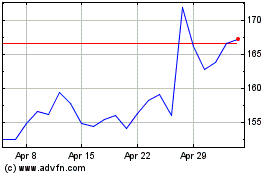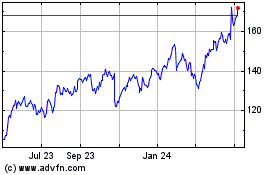Adblock Plus Is Launching an Ad Exchange
September 14 2016 - 8:32PM
Dow Jones News
By Jack Marshall
Eyeo GmbH, the company behind the popular online ad blocking
software Adblock Plus, said on Tuesday it is launching an online
advertising service to help marketers place "acceptable" ads before
users with ad blocking technology turned on.
Eyeo is joining with ad tech firm ComboTag to create an
automated ad marketplace, often referred to as an ad exchange, the
companies said.
Publishers can sign up for the marketplace, called the
"Acceptable Ads Platform," and use it to sell and place ad space on
their webpages.
"Acceptable ads" are allowed to pass through Adblock Plus's
filters by default, provided they aren't too intrusive or
disruptive to users, it said.
The Acceptable Ads Platform will contain only ads that abide by
its Acceptable Ads criteria, which dictate the size, placement and
labeling of ads, Eyeo said.
Alphabet Inc.'s Google and ad tech specialist AppNexus also will
have a hand in helping to sell ad space from the new platform, by
offering it up to potential buyers through their own online ad
exchanges.
All of the companies in the chain, including Eyeo, ComboTag,
Google and AppNexus will take a cut of the revenue generated from
the ads they help to sell and place on publishers' sites through
the program. The remainder will be passed to publishers, Eyeo
said.
In a statement, Google said, "We review the validity and quality
of inventory made available on our platform, but have no knowledge
of ComboTag or Eyeo's SSP arrangements." An AppNexus spokesperson
confirmed that the company is helping to sell ad space from the
Acceptable Ads Platform across its platform. Ad buying behemoth WPP
has an ownership stake in AppNexus.
Many publishers have railed against ad blocking as a technology
that robs them of ad revenue. Some industry executives have had
harsh words for Adblock Plus, whose business model they say
effectively involves putting up a barrier to ads on publishers'
sites, and then asking for payment to take that barrier down.
Eyeo disputes that assessment and says it is just looking out
for the best interests of web users who are tired of being
overwhelmed by internet advertising that slows down their web
surfing and pitches products they don't want. The company is
billing its new ad exchange as a way to help publishers recoup ad
revenues lost because of ad blocking, by "monetizing ad blocker
users with alternative, less intrusive ads."
"There are two ecosystems of online consumers out there right
now: the one composed of people who block intrusive ads and the
other where people do not," said Eyeo Chief Executive Till Faida in
a statement. "The Acceptable Ads Platform lets publishers reach the
former group without changing anything about how they're reaching
the latter."
Over a quarter of U.S. internet users now employ online
ad-blocking software on their desktop computers, according to
recent research commissioned by the Interactive Advertising Bureau.
Ad blocking affects some websites more than others. Some
gaming-related websites, for example, say their audiences now block
large portions of their advertising. In total, ads from some 700
companies, including advertisers, publishers and ad networks, meet
Eyeo's acceptable ads policy, a spokesperson for the company said.
Eyeo already accepts payment from around 70 companies in exchange
for letting their ads through its filter.
The Acceptable Ads Platform could allow Eyeo to scale up that
"whitelisting" process, which could result in more revenue for the
company.
The Acceptable Ads Platform has been in beta for around a month
with a dozen publisher sites, according to ComboTag CEO Guy
Tytunovich. During that time the prices of the ads it has sold via
Google and AppNexus have "skyrocketed," Mr. Tytunovich said,
because advertisers are eager "to tap into users that are tech
savvy and blocking advertising."
ComboTag's Mr. Tytunovich said his company has devised an
automated tool to quickly and easily determine whether or not ads
meet Eyeo's Acceptable Ads criteria. Whitelisting ads used to take
weeks, but now happens in seconds, the companies said.
Advertisers will not be able to target ads via the Acceptable
Ads Platform using the granular behavioral data many have become
accustomed to, however, to preserve user privacy and security.
Rather, they would have a limited set of information with which to
target their ads, including the domain on which an ad would appear;
the device, browser and operating system on which it is being
loaded; and the geographical location it is being loaded from.
Eyeo declined to disclose which companies are on its "whitelist"
-- those that escape ad-blocking. According to a person familiar
with the company's business relationships, paying customers of Eyeo
include Google, Microsoft Corp. and Taboola.
Write to Jack Marshall at Jack.Marshall@wsj.com
(END) Dow Jones Newswires
September 14, 2016 20:17 ET (00:17 GMT)
Copyright (c) 2016 Dow Jones & Company, Inc.
Alphabet (NASDAQ:GOOGL)
Historical Stock Chart
From Mar 2024 to Apr 2024

Alphabet (NASDAQ:GOOGL)
Historical Stock Chart
From Apr 2023 to Apr 2024
